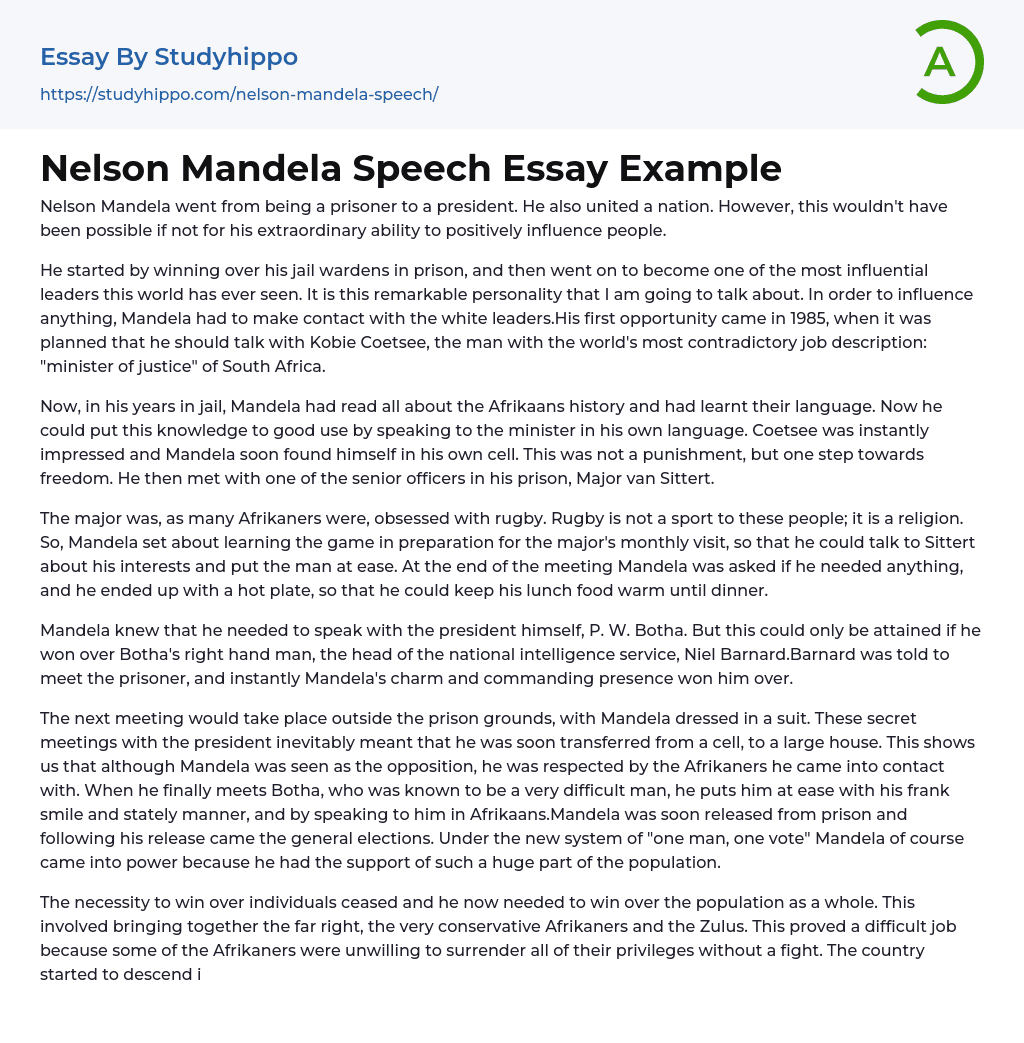Nelson Mandela went from being a prisoner to a president. He also united a nation. However, this wouldn't have been possible if not for his extraordinary ability to positively influence people.
He started by winning over his jail wardens in prison, and then went on to become one of the most influential leaders this world has ever seen. It is this remarkable personality that I am going to talk about. In order to influence anything, Mandela had to make contact with the white leaders.His first opportunity came in 1985, when it was planned that he should talk with Kobie Coetsee, the man with the world's most contradictory job description: "minister of justice" of South Africa.
Now, in his years in jail, Mandela had read all about the Afrikaans history and had learn
...t their language. Now he could put this knowledge to good use by speaking to the minister in his own language. Coetsee was instantly impressed and Mandela soon found himself in his own cell. This was not a punishment, but one step towards freedom. He then met with one of the senior officers in his prison, Major van Sittert.
The major was, as many Afrikaners were, obsessed with rugby. Rugby is not a sport to these people; it is a religion. So, Mandela set about learning the game in preparation for the major's monthly visit, so that he could talk to Sittert about his interests and put the man at ease. At the end of the meeting Mandela was asked if he needed anything, and he ended up with a hot plate, so that he could keep his lunch food warm until dinner.
Mandela kne
that he needed to speak with the president himself, P. W. Botha. But this could only be attained if he won over Botha's right hand man, the head of the national intelligence service, Niel Barnard.Barnard was told to meet the prisoner, and instantly Mandela's charm and commanding presence won him over.
The next meeting would take place outside the prison grounds, with Mandela dressed in a suit. These secret meetings with the president inevitably meant that he was soon transferred from a cell, to a large house. This shows us that although Mandela was seen as the opposition, he was respected by the Afrikaners he came into contact with. When he finally meets Botha, who was known to be a very difficult man, he puts him at ease with his frank smile and stately manner, and by speaking to him in Afrikaans.Mandela was soon released from prison and following his release came the general elections. Under the new system of "one man, one vote" Mandela of course came into power because he had the support of such a huge part of the population.
The necessity to win over individuals ceased and he now needed to win over the population as a whole. This involved bringing together the far right, the very conservative Afrikaners and the Zulus. This proved a difficult job because some of the Afrikaners were unwilling to surrender all of their privileges without a fight. The country started to descend into violence.However, Mandela saw an opportunity that could bring these two sides together; that could unite a nation. This was the 1995 Rugby World Cup.
And it was just a year away. On
May 25 1995, the Springboks would play Australia in the first match of the world cup. The day before, the team was gathered at Silvermine, an old military base where they had established a temporary training camp. Mandela flew in by helicopter to see them. His total dedication and support for the team is shown here and his infectious enthusiasm made the match important for many other black South Africans.As a token of gratitude, one of the players handed him his green Springbok cap.
Mandela's commitment is reinforced further when he decides to wear Francois Pienaar's, the captain's, rugby jersey to the final of the world cup. This must have convinced the Afrikaners that he was completely behind their team. South Africa was playing New Zealand at home. 5 minutes before kick off he stepped out onto the field wearing the jersey and the cap he'd been given to shake hands with each of the players. At first the crowd went silent, and then they began to chant Nelson! Nelson! hich is amazing because most of the crowd was made up of white people.
South Africa went on to beat New Zealand and following the win the country was transformed. His support for the world cup had helped to unite a divided country; it had made a nation. On presenting the trophy to Pienaar he said "Francois, thank you very much for what you have done for our country. And Francois replied "No, Mr President, thank you very much for what you have done for our country.
Mandela respected people, even his presumed enemies, and by getting to know the people underneath, they respected and followed
him. He made the new South Africa what it was.
- Cuban Missile Crisis essays
- Fidel Castro essays
- French Revolution essays
- Han Dynasty essays
- Hiroshima essays
- Imperialism essays
- Jack The Ripper essays
- Mao Zedong essays
- Middle Ages essays
- Mongols essays
- Nelson Mandela essays
- Ottoman Empire essays
- Reformation essays
- Reign of Terror essays
- Renaissance essays
- Roaring Twenties essays
- Romanticism essays
- Samurai essays
- Scientific Revolution essays
- Soviet Union essays
- Nigeria essays
- South Africa essays




